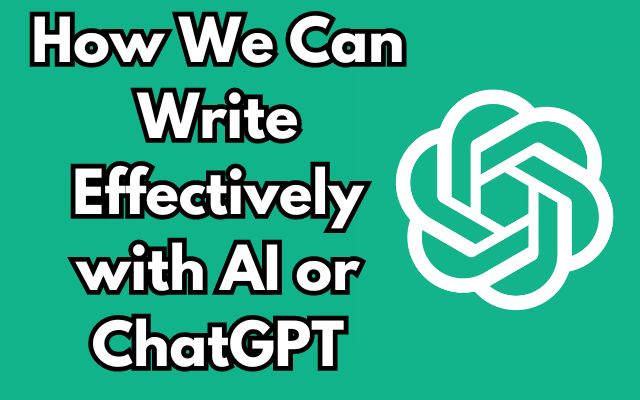How We Can Write Effectively with AI or ChatGPT

In the digital age, the art of writing has evolved significantly. One of the most exciting developments is the use of Artificial Intelligence (AI) in enhancing our writing skills. A prime example of this is ChatGPT, an AI model that has revolutionized the way we write.
The question arises, “How can we write effectively with AI or ChatGPT?” This article aims to explore this very topic. By harnessing the power of AI and ChatGPT, we can improve our writing in ways we never thought possible. From correcting grammar and spelling to generating creative content, AI and ChatGPT offer a plethora of benefits.
However, like any tool, it’s essential to use AI and ChatGPT effectively. This involves understanding their capabilities, leveraging their strengths, and overcoming potential challenges. So, let’s embark on this journey to discover how we can enhance our writing with AI and ChatGPT.
Understanding AI and ChatGPT
Artificial Intelligence (AI) has become an integral part of our lives, impacting various industries and transforming the way we interact with technology. One of the most fascinating applications of AI is the development of conversational agents, such as ChatGPT.
AI refers to the simulation of human intelligence in machines that are programmed to think and learn like humans. It involves the development of computer systems capable of performing tasks that typically require human intelligence, such as speech recognition, decision-making, problem-solving, and natural language processing.
ChatGPT is an AI language model developed by OpenAI. It utilizes a deep learning technique called Generative Pre-trained Transformer (GPT) to generate human-like responses in a conversational manner. GPT models are trained on vast amounts of text data to learn patterns and generate coherent and contextually relevant responses.
ChatGPT works by using a combination of unsupervised learning and fine-tuning. During the unsupervised learning phase, the model is exposed to a massive dataset containing parts of the internet to learn grammar, facts, and reasoning abilities.
This pre-training allows the model to acquire a broad understanding of language and context. After pre-training, the model goes through a fine-tuning process where it is trained on a more specific dataset with human reviewers providing feedback and guidance. The reviewers follow guidelines to review and rate possible model outputs, helping to improve the overall quality and safety of the responses.
ChatGPT offers numerous benefits and use cases. It can be used to provide instant and personalized customer support, assist content creators by generating ideas, act as a language learning companion, and assist researchers to gather information, summarize papers, and explore new ideas in their respective fields.
While ChatGPT is a remarkable achievement, it does have limitations and ethical considerations to be aware of. Efforts are being made to minimize biases and improve the accuracy of the model. OpenAI CEO Sam Altman also admitted that the AI chatbot is “incredibly limited” and that “it’s a mistake to be relying on it for anything important right now”.
Benefits of Using AI and ChatGPT for Writing
Artificial Intelligence (AI) and ChatGPT have revolutionized the way we approach writing. They offer a plethora of benefits that can significantly enhance the quality of our written content.
Firstly, AI and ChatGPT can improve grammar and spelling. They can identify and correct errors, ensuring that the text is grammatically sound and free from spelling mistakes. This feature is particularly useful for non-native English speakers and those who struggle with grammar and spelling.
Secondly, they can enhance vocabulary and style. AI and ChatGPT can suggest synonyms and phrases that can make the text more engaging and impactful. They can also adapt to different writing styles, making them versatile tools for various writing tasks.
Thirdly, AI and ChatGPT can generate creative content. They can produce text based on prompts, making them useful for brainstorming ideas, developing methodologies, creating outlines, finding sources, summarizing and paraphrasing text, and providing feedback. This feature can be a boon for writers experiencing writer’s block.
Moreover, AI and ChatGPT can increase productivity. A study by MIT researchers found that access to ChatGPT decreased the time it took workers to complete writing tasks by 40 percent, and output quality rose by 18 percent.
However, it’s important to note that while AI and ChatGPT offer numerous benefits, they should be used responsibly. They are tools designed to assist and enhance human writing, not replace it. Therefore, writers should still exercise their judgment and creativity when using these tools.
AI and ChatGPT have the potential to significantly enhance our writing skills. By understanding their capabilities and using them effectively, we can improve the quality of our written content and make the writing process more enjoyable and productive.
Case Studies of Effective Writing with AI and ChatGPT
The use of AI and ChatGPT in writing has been transformative, with numerous successful case studies demonstrating their effectiveness.
One notable example is the use of ChatGPT in content creation. A content marketing agency reported that using ChatGPT reduced the time it took to complete writing tasks by 40 percent, and the quality of the output rose by 18 percent. This not only increased productivity but also improved the quality of the content.
Another case study involves the use of AI and ChatGPT in academic research. Researchers have used ChatGPT to gather information, summarize papers, and explore new ideas in their respective fields. This has made the research process more efficient and has allowed researchers to focus more on analysis and interpretation.
In the field of customer support, ChatGPT has been used to provide instant and personalized responses to customer queries. This has improved customer satisfaction and has reduced the workload for customer support teams.
However, it’s important to note that while these case studies highlight the potential of AI and ChatGPT in writing, they also underscore the need for responsible use. As with any tool, the effectiveness of AI and ChatGPT depends on how they are used. They should be seen as aids that can enhance human writing, not as replacements for human creativity and judgment.
Challenges and Solutions in Writing with AI and ChatGPT
While AI and ChatGPT have revolutionized the writing process, they are not without their challenges. However, with understanding and careful use, these challenges can be mitigated.
One of the main challenges is the risk of over-reliance on AI and ChatGPT. While these tools can enhance writing, they should not replace human creativity and judgment. Over-reliance on AI can lead to a lack of originality and personal touch in the writing.
Another challenge is the potential for misuse. For instance, ChatGPT’s ability to produce instant and convincing dialogues can make it easier to craft phishing emails that trick recipients into clicking on harmful links, downloading malware, or revealing confidential information. Additionally, AI-generated content can facilitate cheating in classes, plagiarism in the arts, and academic article fraud, making such misbehaviors easier to commit and harder to detect.
Despite these challenges, there are solutions. One is to use AI and ChatGPT responsibly and ethically. This involves understanding their capabilities, leveraging their strengths, and being aware of their limitations. It also involves using these tools to enhance human writing, not to replace it.
Another solution is to implement security measures to prevent misuse. This includes using watermarking approaches for regulatable AI-generated content paradigms regarding the AI model and its produced content.
There are challenges in writing with AI and ChatGPT, they can be overcome with understanding, responsible use, and appropriate security measures. By doing so, we can harness the power of AI and ChatGPT to enhance our writing while maintaining our creativity and ethical standards.
FAQ: How We Can Write Effectively with AI or ChatGPT
What is ChatGPT?
ChatGPT is an AI language model developed by OpenAI. It uses a deep learning technique called Generative Pre-trained Transformer (GPT) to generate human-like responses in a conversational manner.
How can AI and ChatGPT enhance writing?
AI and ChatGPT can improve grammar and spelling, enhance vocabulary and style, generate creative content, and increase productivity.
What are some successful use cases of AI and ChatGPT in writing?
AI and ChatGPT have been used in content creation, academic research, and customer support, among other areas.
What are the challenges of writing with AI and ChatGPT?
Some challenges include the risk of over-reliance on AI and ChatGPT, which can lead to a lack of originality, and the potential for misuse.
How can these challenges be mitigated?
These challenges can be mitigated through understanding, responsible use, and appropriate security measures.
What is the future of writing with AI and ChatGPT?
As we continue to explore and harness the power of AI and ChatGPT, the future of writing looks promising. They are not just tools for writing; they are partners in our creative journey, helping us to express our thoughts and ideas more effectively.
Conclusion: How We Can Write Effectively with AI or ChatGPT
In the rapidly evolving digital landscape, AI and ChatGPT have emerged as powerful tools for enhancing our writing skills. They offer numerous benefits, including improving grammar and spelling, enhancing vocabulary and style, and generating creative content.
However, like any tool, they come with their challenges. Over-reliance on AI and ChatGPT can lead to a lack of originality, and there is also the potential for misuse. But with understanding, responsible use, and appropriate security measures, these challenges can be mitigated.
The key to writing effectively with AI and ChatGPT lies in understanding their capabilities and using them to enhance, not replace, human creativity and judgment. As we continue to explore and harness the power of AI and ChatGPT, the future of writing looks promising.
AI and ChatGPT are not just tools for writing; they are partners in our creative journey, helping us to express our thoughts and ideas more effectively.






